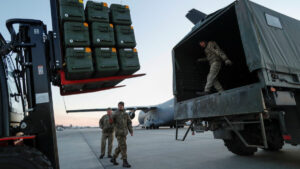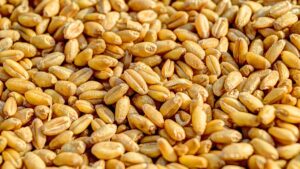
Lithuania has transferred a new military aid package worth 41 million euros to Ukraine, the Lithuanian Defense Ministry said on Thursday.
According to the Defense Ministry, the package includes Carl Gustaf ammunition, rifles, maritime surveillance radar kits, 5.56 mm caliber ammunition, generators, and antidrones, among others.
NASAMS rocket launchers will also be transferred to Ukraine.
“Lithuania’s contribution to Ukraine’s freedom struggle has already amounted to millions of rounds of ammunition and thousands of weapons, and in return, valuable lessons have been learned and Lithuania’s defense has been strengthened. Lithuania continues to provide unwavering support to Ukraine, which today celebrates the 32nd anniversary of its independence, and the total amount of military assistance provided to Ukraine since the beginning of the war has already exceeded half a billion euros,” the press release quoted Lithuanian Defense Minister Arvydas Anušauskas as saying.
According to the Defense Ministry, in the first seven months of this year, Lithuania supplied Ukraine with Mi-8 helicopters, L-70 anti-aircraft guns with ammunition, M113 armored personnel carriers, millions of rounds of ammunition, and ammunition for grenade launchers.
“Lithuania also provides expert advice, contributes to international funds to support Ukraine, contributes to the training of Ukrainian soldiers, holds courses for them, and Lithuanian military instructors participate in Operation Interflex, during which, together with other NATO allies, train Ukrainian soldiers in the subtleties of combat,” the ministry said in a statement.
The ministry also noted that medical and rehabilitation institutions of the country had received about 200 wounded Ukrainian servicemen and planned to receive more.

Nova Posta Group of Companies has launched an opportunity to call a courier to the address in Lithuania to send documents and parcels up to 30 kilograms to Ukraine, the group’s press service said on Thursday.
According to the release, the courier can be called to any address throughout Lithuania: even in places where there are no Nova Post offices yet.
It is indicated that the call costs EUR3.5 to the cost of delivery to Ukraine, but until August 13, a 30% discount is given for delivery from Lithuania to Ukraine.
To call a courier in Lithuania, you need to prepare a parcel for shipment, fill out an application for courier call on the website, application or business cabinet, pay for the order and give it to the courier in closed form.
“Nova Posta” reminds that sending a parcel from Lithuania is subject to customs duty and 21% VAT if the value of the parcel exceeds EUR45. Therefore, in the application form you should fill in the contents of the shipment, the declared or market value of each item. If the real value will differ from the declared value, the customs service may revalue and charge additional customs payments to the recipient.
As reported, Nova Post opened the first NovaPost branch in Lithuania on March 20 this year. Outside Ukraine, the group also already operates in Poland, Czech Republic, Moldova, Romania and Germany.
At the beginning of July, the NovaPost network included more than 10 thousand outlets and over 14 thousand post offices.
According to Standard-Rating, Novaya Posta’s revenue in the first quarter of 2023 increased 2.1 times to UAH 8 billion 83.1 million, EBITDA – almost 4.4 times to UAH 1 billion 307.8 million, and net profit – almost eight times to UAH 1 billion 54.91 million.

Nova Posta LLC, the leader of express delivery in Ukraine, has opened the second Nova Post post office in Kaunas, Lithuania, the company’s press service said Monday.
In the department you can send and receive parcels and freight up to 1 thousand kg, as well as documents. The delivery time is five working days.
“This is already the second Nova Post branch in Lithuania. Now, in addition to courier delivery, Ukrainians from Kaunas and nearby cities have an opportunity to easily send things home and quickly receive parcels from Ukraine through the branch,” reads the report.
The first Nova Post branch in Lithuania was opened in Vilnius in March. It is noted that Ukrainians most often send documents, clothes, shoes, cosmetics and books.
Also, in addition to delivery to the offices, you can order addressed delivery to any city in Lithuania or Ukraine, the press service specified.
It was informed earlier that Nova Posta Company has corrected its plans concerning the entering to the new markets of Europe and plans to open departments in Germany after the opening of the first two departments in Prague (Czech Republic).
Founded in 2001 Nova Posta is the leader in the market of express-delivery in Ukraine. Its network consists of more than 6 thousand offices all over the country.
“Nova Posta provides a full range of logistics and related services.
It includes Ukrainian and foreign companies, including Nova Posta, NP Logistik, Post Finance (Forpost system) and Nova Posta Global.

The Lithuanian government may help Ukraine export up to 1 million tons of grain by rail after Poland temporarily banned grain imports from Ukraine, said Lithuanian Economy and Innovation Minister Ausrini Armonaitė.
“The port of Klaipeda and Lithuanian Railways can play an important role in creating momentum to help Poland resolve the situation and guarantee grain exports outside the EU. Lithuania could help safely transport up to 1 million tons of grain from Ukraine by rail. This would be a real solution for Ukraine and a benefit for Poland,” Verslo zinios quoted the minister as saying.
In turn, the president of the Association of Lithuanian Sea Cargo Companies Vaidotas Shileyko noted that the port of Klaipeda is able to process more than 1 million tons of grain a year, but because of the difficult logistics, it is impossible to import more.
“Lithuanian railroads started transporting small volumes of Ukrainian grain through Poland to the port of Klaipeda last May. The main problem here is different railway gauges: Ukraine and Lithuania still use Russian gauges, while Poland uses European ones, which means that rolling stock has to be changed at the border,” he explained.

“Nova Posta enters the Lithuanian market and opens its first branch in Vilnius and plans to open a second branch in Kaunas, Lithuania’s second-largest city, co-founder of Nova Posta said in a few months. Vyacheslav Klimov, co-founder of Novaya Posta.
“We plan to open two branches in Lithuania: a cargo branch in Vilnius this month and a post office in Kaunas in a few months,” Klimov told the Interfax-Ukraine news agency on the sidelines of the Forbes Ukraine Exporters Summit in Kiev.
According to him, this year it is also planned to open offices in the Czech Republic, Romania and Germany and to expand the network in Poland to all the provinces.
At the same time, the company is not considering opening post offices in Poland and Lithuania. “Both Poland and Lithuania are quite densely covered by post offices of different companies, so it is more reliable now feel the strategy to come with our offices and our address delivery,” Klimov explained.
Co-owner of “New Mail” confirmed plans to open branches in Germany this year and noted that the company is attracted by the capacity of the markets, because the number of parcels per capita in Poland is 2-3 times, and in Germany – 3-4 times more than in Ukraine.
Sources of funding the expansion to foreign markets are the company’s own funds, Klimov said. In Ukraine, the company plans to continue to open new offices, install postal terminals, and also in the fall will complete the construction of two new sorting centers Kiev-East and Odessa.
Founded in 2001 Nova Posta Group is the biggest participant of Ukrainian logistics market: its network consists of about 10 ths offices and 13 ths postal terminals throughout Ukraine. The number of shipments in 2021 exceeded 372 million. Besides, a non-banking financial institution NovaPay provides services for money transfers and e-money transactions. There were 388 million transactions in 2021.
Detailed results of GC in 2022 have not yet been announced, but Klimov stated that the number of shipments at the end of the year will be restored to 95% of the pre-war level.
The group also includes Nova Posta Global, which is developing an international partner network to provide customers with express delivery services not only in Ukraine but also abroad. The company performs regular flights to the U.S., Europe and China and delivered 9.3 million international shipments in 2021.

The L-70 anti-aircraft guns were sent from Lithuania to Ukraine on Friday, LRT reported.
“They will be able to destroy enemy planes, helicopters and UAVs at a distance of up to 5 kilometers in any weather conditions,” the report says.
It is noted that in addition to the anti-aircraft guns, ammunition and other equipment necessary for the operation of these units will also be transferred to Ukraine in the near future.